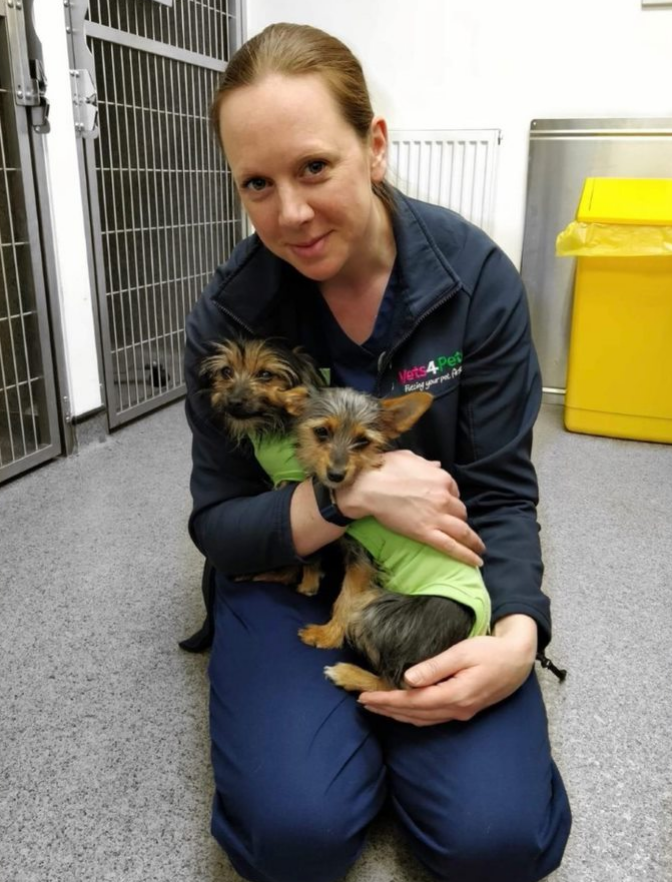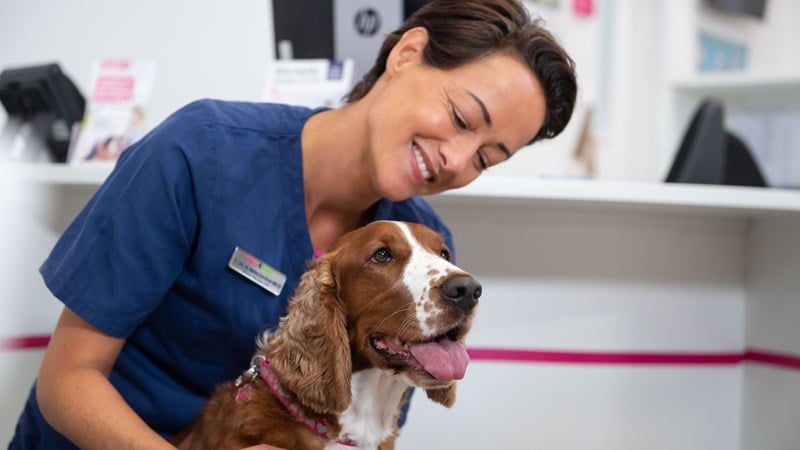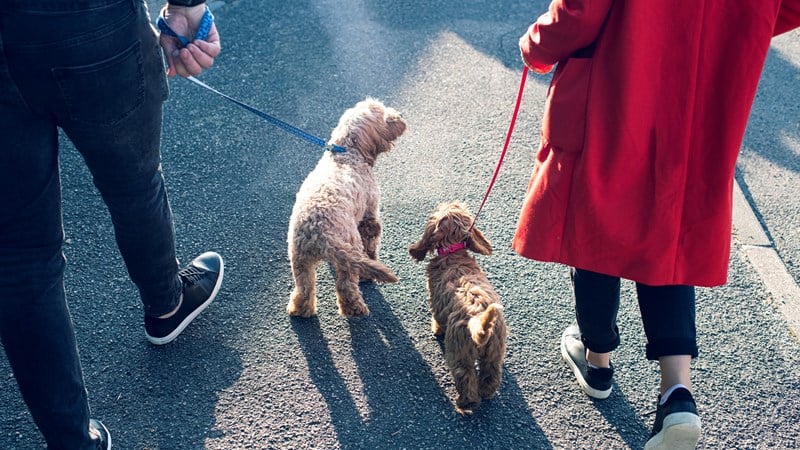
Vaccinations for Puppies
Vaccination is a great way to give your puppy immunity to infectious diseases and make sure they are as safe as they can be.
Getting a new puppy is a really exciting time with lots to think about, but it’s important not to forget to give them their vaccinations! Puppies can suffer from a range of nasty diseases, some which cause a lot of discomfort and others that can kill. Thankfully, we can protect our puppies from some of these. Vaccination is a great way to give your puppy immunity to some of the worst infectious diseases, and make sure they are as safe as they can be.
When should my puppy be vaccinated?
Once your puppy is 6 - 8 weeks old, they can have their first vaccinations – usually called the primary course. This consists of two or three injections, given 2 – 4 weeks apart, based on local risk factors. Your vet will discuss the most suitable option for your pet. Some puppies will have their first of these vaccinations while they are still with their breeder.
After your puppy's second round of vaccinations we advise waiting two weeks until taking your puppy outside so that they are fully protected in public spaces. Once any puppy has had their initial course of injections, they will only need one injection per year afterwards to keep that immunity ‘topped up’.
What happens at a vaccination appointment?
A vaccination appointment is much more than a quick injection for your puppy.
Your puppy will be weighed, and have a thorough medical exam. Your vet will probably ask you lots of questions about how your pet has been behaving, about any issues, and about specific topics such as their eating and drinking habits. Don’t be afraid to ask any questions, including about behaviour – your vet will be able to help you get your new puppy settled in as fast as possible.
As well as the thorough exam, your vet will administer the vaccinations. The injection is given under the skin at the back of the neck, and is well tolerated by the vast majority of puppies.
The infectious tracheobronchitis (kennel cough) vaccine is the only vaccine which is not injectable. This is a liquid which is given as a squirt up the nose – no needles involved!
What can I vaccinate my dog against?
Infectious Canine Hepatitis is a viral disease which affects the liver, kidneys, eyes and lungs of a dog. It is spread by contact with saliva, urine, faeces, blood or nasal discharge of infected dogs. The urine of an infected dog can be infectious for up to a year, and the virus can survive in the environment for many months.
Signs can vary from slight fever to sudden death. Other signs include loss of appetite, pale gums, conjunctivitis, coughing, abdominal pain, vomiting and diarrhoea. The disease can develop very quickly and sadly there is no specific treatment; however vets will try and alleviate the signs and dogs can sometimes survive with intensive supportive treatment.
Leptospirosis, often referred to as lepto, is caused by a bacteria not a virus. Dogs can become infected if they come into contact with infected urine, or by contaminated water, so if your dog likes to swim or is partial to drink from stagnant water or canals they can be at risk, especially in areas with high numbers of rats. There are many different strains of leptospirosis and humans can get it as well (called Weil’s disease). It can be fatal in both dogs and humans.
The signs often start 4 to 12 days after exposure to the bacteria. Look out for fever, muscle pain, diarrhoea, lack of appetite, jaundice and lethargy. Leptospirosis primarily affects the kidneys and liver so more serious cases will get kidney and liver failure.
Treatment will usually consists of antibiotics, fluid replacement, controlling the vomiting and other supportive liver treatments. Less severely affected dogs will recover but still carry the bacteria in their urine for months, posing an infection risk to other animals and humans. There are many stains of leptospirosis – the most comprehensive canine vaccine available covers four strains, and is known as the ‘L4 vaccine’.
Distemper virus can be fatal and attacks several body systems including the respiratory and nervous system. Even in dogs which recover from the virus, distemper can cause long term neurological problems. The first signs of distemper are often sneezing, coughing and a mucus from the eyes and nose, followed by fever, lethargy, vomiting, diarrhoea, depression and weight loss. Distemper is sometimes called ‘hard pad’ because the pads of the feet of some affected dogs become very thickened.
The virus can be transmitted through direct contact with fresh urine, blood or saliva, plus sneezing, coughing and sharing food or water bowls.
Sadly there is no known cure for distemper; the only treatment is to alleviate the signs. Even if a dog survives distemper there are often long-term effects such as muscle spasms, epileptic fits and even limb paralysis.
Canine Parvovirus, commonly known as parvo, is a highly contagious viral disease that can be life threatening to your dog. It is most likely to infect puppies up to six months of age, but can affect older dogs as well, especially dogs that have never been vaccinated or are not up to date with their annual vaccinations. Unfortunately outbreaks are still commonly reported in the UK, and a parvo infection can kill.
Parvo is spread by direct contact with saliva or faeces of an infected animal; humans can also carry the disease on their hands and clothing from one dog to another. Usually dogs will have severe vomiting and diarrhoea which is often bloody (haemorrhagic) and this will lead to dehydration. Anorexia, depression and fever are also common signs.
Dogs with parvo will require hospitalisation, often for many days, and will be put on a drip to correct dehydration. Antibiotics will be given to prevent any secondary infections as well as antiviral medication if available. Unfortunately a lot of dogs with parvo won’t survive, even with intensive supportive treatment, which is why it is so important to prevent the disease with vaccination in the first place.
Also called kennel cough, canine infectious tracheobronchitis is a respiratory infection caused by a number of bacteria and viruses. Kennel cough is airborne and highly infectious, and can be spread by being close to infected dogs, or sharing items such as toys or bowls. The name kennel cough can be misleading as, although it can spread rapidly in situations with lots of dogs such as boarding kennels, any dog in contact with an infected dog can contract the illness.
The main sign of infectious tracheobronchitis is a forceful hacking cough, which may sound like retching, or trying to clear something stuck in the throat. Infectious tracheobronchitis may go away on its own if your dog’s immune system is able to fight off the condition, but many puppies need prescription medication to help them recover. It is best to get your dog checked out by your vet at the first signs of coughing as not only will they be posing an infection risk to other puppies, but the longer the condition persists, the higher the chance of more serious complications, such as pneumonia. There are also other, more serious causes of coughing, so any coughing puppy should be checked over.
You can minimise the chance of your dog contracting infectious tracheobronchitis by having your dog vaccinated. It is important to note that your standard yearly booster does not protect against infectious bronchitis/kennel cough.
Thankfully rabies is not present in the UK, but if you want to take your dog abroad and bring them back into the country, or if you want to adopt a dog from overseas, they will need to be vaccinated against rabies for their pet passport.
There are several other requirements for overseas travel, which differ depending on where you are travelling to. Speaking to your vet before you travel and getting all your documentation in place is critical for a smooth and stress-free journey for you and your pet.
Expert top tip
We asked Tammy Miles, Senior Registered Veterinary Nurse at Vets4Pets Leeds Birstall, for her top tip for ensuring that puppies have a positive experience at their first vaccination appointment:
 "As difficult as it is to see your little baby receive an injection, try to keep calm, it's amazing how much your puppy can pick up on their owner's anxiety even when they have only spent a short amount of time with their new family."
"As difficult as it is to see your little baby receive an injection, try to keep calm, it's amazing how much your puppy can pick up on their owner's anxiety even when they have only spent a short amount of time with their new family."
"If you feel that you will become too anxious or are needle-shy yourself, the vet can ask for nurse assistance whilst you step out of the consult room briefly whilst the vaccination takes place."
Health Plans to keep your puppy healthy
At Vets4Pets we offer a range of Health Plans that make essential routine treatments more affordable. You'll save money on things like annual vaccinations, flea and worm treatment and routine health check-ups.

Join our free VIP Puppy club
Join the club for expert advice and tailored offers, including £30 off our Complete Care Health Plans

Puppy & Kitten Advice
Giving your pet the best start in life begins with getting the best expert advice.
